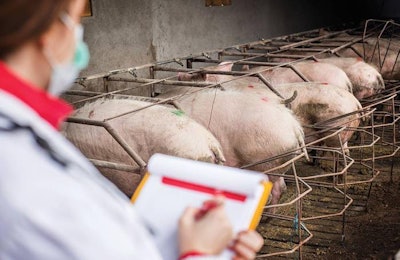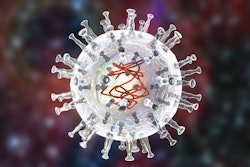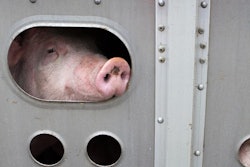
African swine fever continues to spread in European countries
African swine fever (ASF) has recently been detected on farms in Romania and Russia. While the disease continues to cause heavy losses among the European wild boar population, it appears to have been controlled in three Ukrainian regions. In Ivory Coast, there have been formal discussions on how to control the disease.
Continuing a recent trend, the European state officially reporting the greatest number of new outbreaks of ASF over the past week is Romania.
There have been a total of nine new outbreaks in domestic pigs across the south and east of the country, according to the national veterinary authority. Its reports to the World Organisation for Animal Health (OIE) outline cases among eight backyard herds, and at one large farm.
Involving almost 24,000 pigs, the farm outbreak was in the Arges region in central southern Romania. It started in mid-February, and 432 of the animals died. Culling of the rest of the herd was ongoing at the time of reporting.
Up to March 1, there have been 160 confirmed outbreaks of ASF among domestic pigs in Europe since the start of 2020, according to the European Commission (EC). The total has risen by 10 since the previous week. From this source, worst affected has been Romania (146 outbreaks). Bulgaria has reported 11 outbreaks, two outbreaks have occurred in Ukraine, and one in Greece. EC figures do not include Russia.
Two new outbreaks on Russian farms
In late February and early March, ASF was confirmed at two farms in Russia. According to the agriculture ministry’s official report to the OIE, a total of more than 1,800 pigs were involved in these outbreaks.
First was a unit with more than 1,500 pigs in Krasnodar krai. Here, the presence of the ASF virus was confirmed after 370 of the animals died. In early March, there were 33 cases and six deaths among a herd of 300 pigs in the oblast of Volgograd. Both regions are in Russia’s Southern federal district.
ASF ‘resolved’ in Ukraine
After previous outbreaks, Ukraine’s animal health agency has declared to the OIE that the ASF situation has been “resolved” in three of its regions — Rovno, Mykolaiv and Poltava.
In Poltava and Mykolaiv, there have been no new cases among domestic pigs since November 2019. In Rovno, a pig carcass found dumped outside a village in January tested positive for the ASF virus, but the virus has not been detected in the oblast since that time.
More cases among European wild boar
Reporting new cases of ASF in wild boar to the OIE in the past week were Hungary (230 cases), Romania (72), Moldova (28), Slovakia (22), Russia (10), Latvia (2) and Belgium (1).
The Belgian case was detected in the remains of a wild boar that has been dead for more than six months. The carcass was found in the infected zone in the province of Luxembourg. The ASF virus has not been detected in a live animal in the country since August 2019.
EC records 2,345 confirmed outbreaks of ASF in wild boar for the year to March 1. This represents an increase of 296 from the previous week.
According to this source, Poland has recorded the most outbreaks — 933 — which is a jump of 152 from the week before. Other states to have confirmed ASF outbreaks to the EC so far this year are Hungary (717), Romania (275), Bulgaria (207), Latvia (64), Lithuania (50) and Italy (32). Belgium, Estonia, Moldova, Serbia, Slovakia and Ukraine have each reported no more than 30 outbreaks so far this year.
Africa: ASF controls stepped up in Ivory Coast
At a recent meeting in Dabou, stakeholders in the pig sector in Ivory Coast (Cote d’Ivoire) discussed ways to tackle ASF. Organized by the agriculture ministry, the meeting was supported by the United Nations’ Food and Agriculture Organization (FAO), reported press agency AIP.
In July 2019, the West African state detected its first cases of ASF. These were reported to the OIE in October. No further cases have been officially recorded since that time.
Ivory Coast was one of the five African states to report ASF outbreaks during 2019. In January this year, the first cases were reported in Sierra Leone.
Two recent developments offer some hope for the global control of ASF. Research from the United Kingdom has provided further information on the ASF virus that will help in the development of a vaccine and/or antiviral feed additives. Scientists in China report they have created a vaccine that appears to be both safe and effective against ASF in lab tests.
View our continuing coverage of the global African swine fever situation.
















